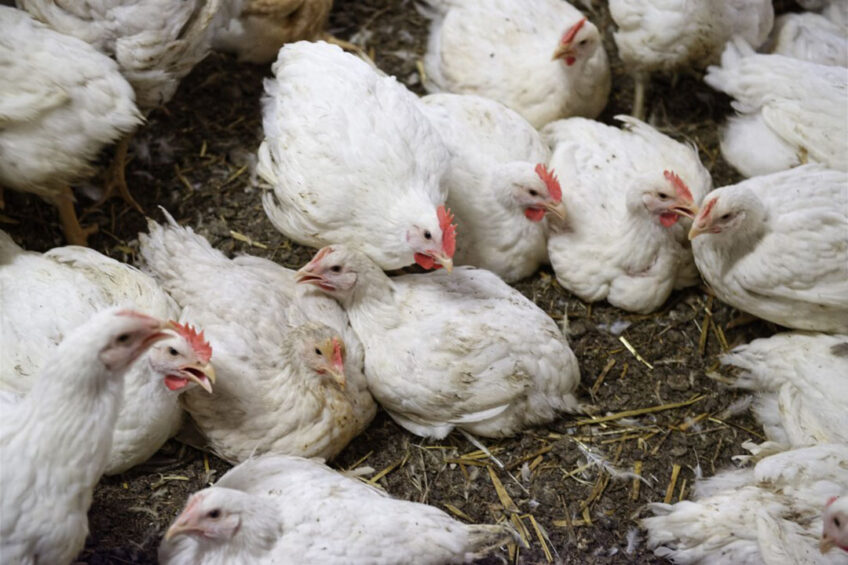Dealing with downgrades and condemnations in poultry

Contract growers and farm managers should prioritise reducing processing downgrades and condemnations for both welfare and financial reasons.
While the UK already sets a high bar in this area, Cobb Europe said it was keen to build on this in areas including scratching, bruising and cellulitis, stocking density, stockmanship and catching and contamination and shrinkage.
Brendan Graaf, Cobb Europe broiler specialist, said bird scratching, bruising and cellulitis (SBC) was often the most common cause for downgrades and condemnations. The main affected areas tended to be hips/thighs and back, wings and drum and they were often closely linked. For example, cellulitis requires a scratch for bacteria to cause infection under the skin.
Feeder and drinker space and stocking density
Graaf added that feeder and drinker space and stocking density also had a major effect. Overstocking will lead to increased competition among the birds and SBC. He suggested the following feeder and drinker space:
- 45-65 birds/33 cm pan
- 12 birds/nipple – high flow drinker lines
- 10 birds/nipple – low flow drinker lines
- Producers should look for equipment breakdowns during daily checks Other tips include:
- Avoid feed programmes that restrict the natural appetite of birds.
- Don’t let feeder pans and drinker lines run dry.
- Clean up fines and turn feeders on before pans are completely empty.
- Make sure to empty the demand/caller pan regularly.
Good stockmanship and catching
Speaking at the annual Northern Broiler Conference, Graaf told delegates that good stockmanship and catching was imperative. Stockmen should always be present during catching, ensuring that all feeder, drinker, enrichment and weighing equipment is lifted or removed. Catchers should move in steadily and in a quiet manner, avoiding abrupt movements which cause flightiness.
“Dimming lights or making use of red, green or blue catching lights can help reduce flightiness,” he said, adding that consideration should also be given to the use of migration fences to avoid overcrowding.
Finally, he highlighted a number of issues around contamination and shrinkage, stressing that clear communication with the planning and catching teams, particularly around the ideal time to lift feeder pans was essential.
Feed withdrawal
Improper feed withdrawal affects the processing of birds, while excessive feed in the crop has a negative impact on yield. Poor intestinal integrity can lead to tears or breaks and therefore lead to poorer meat quality and lower food safety.
Best practice, he said, was to have a feed withdrawal period of between 8 and 12 hours, which should include catching time, transport and holding at the plant.
Water withdrawal
Water withdrawal was equally important as water assists with feed passage through the gastrointestinal tract. Birds should have access to water for a minimum of 2 hours after feed is withdrawn, and best practice is to give birds access to water until the catching crew arrives at the house.
The importance of dry litter and ventilation
Dermatitis and hock burns are big indicators of bird welfare and are caused by ammonia formation from uric acid in faeces and moisture in litter, which irritates the surface contact areas (foot pads, hocks, breast) causing lesions.
The bottom line, he said, is to keep litter dry. Young birds are especially susceptible so keeping the litter dry until 18 days has a positive effect. The litter should have high absorptive qualities but it’s also important to manage the drinker line, looking closely at flow rates, leaks, wet spots – which need to be replaced – as well as making use of drip cups.
Ventilation can also have an impact and minimum vent rates should be based mainly on moisture the birds are adding to the house. Birds do create roughly 20-25% water during digestion of feed so the general rule that should be applied is for every litre of water taken in means roughly one litre is released back into the house/litter. So, if you can get rid of more, house moisture levels fall.
White striping and wooden breast
Graaf also touched on issues around white striping and wooden breast, highlighting the following:
- Early feed and water intake – this helps stimulate satellite cell (muscle stem cell) activity to increase the number of muscle fibres in breast
- Stress factors early on can reduce satellite cell activity – fewer muscle fibres are produced
- Producers should look to ensure CO2 levels remain below 3000ppm
- They should look to achieve a first-week growth ratio of at least 4.8
- Growth should stay close to the breed-specific growth curve for the rest of the cycle
- Too rapid growth during any period is likely to result in a higher risk of birds getting wooden breast.
- Heat stress leads to oxidative stress and hypoxia in breast muscle and fibre damage leading to both wooden breast and white striping.
- Hotter or panting birds tend not to move around or eat and sit for longer periods, which puts pressure on the breast and results in less blood flow and less removal of wastes/delivery of nutrients – leading to both white striping and wooden breast
- Panting also results in less oxygen being made available to the muscles – less removal of waste products, leading to wooden breast
- Producers should place a strong emphasis on temperature management throughout the cycle, especially post 21 days. No bird panting should occur.
- Avoid long periods of darkness for the birds. Too low light intensity will reduce activity so keep at least 20 Lux.
Join 31,000+ subscribers
Subscribe to our newsletter to stay updated about all the need-to-know content in the poultry sector, three times a week. Beheer
Beheer











 WP Admin
WP Admin  Bewerk bericht
Bewerk bericht